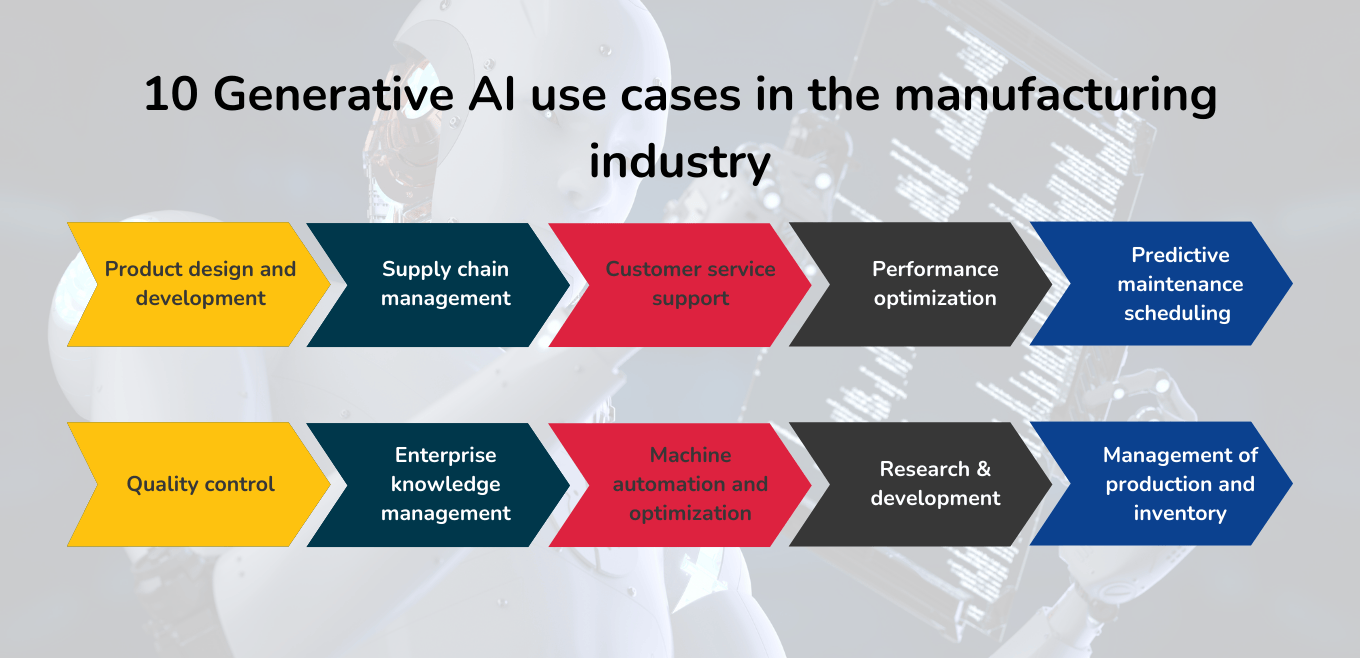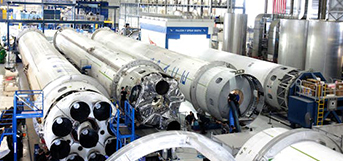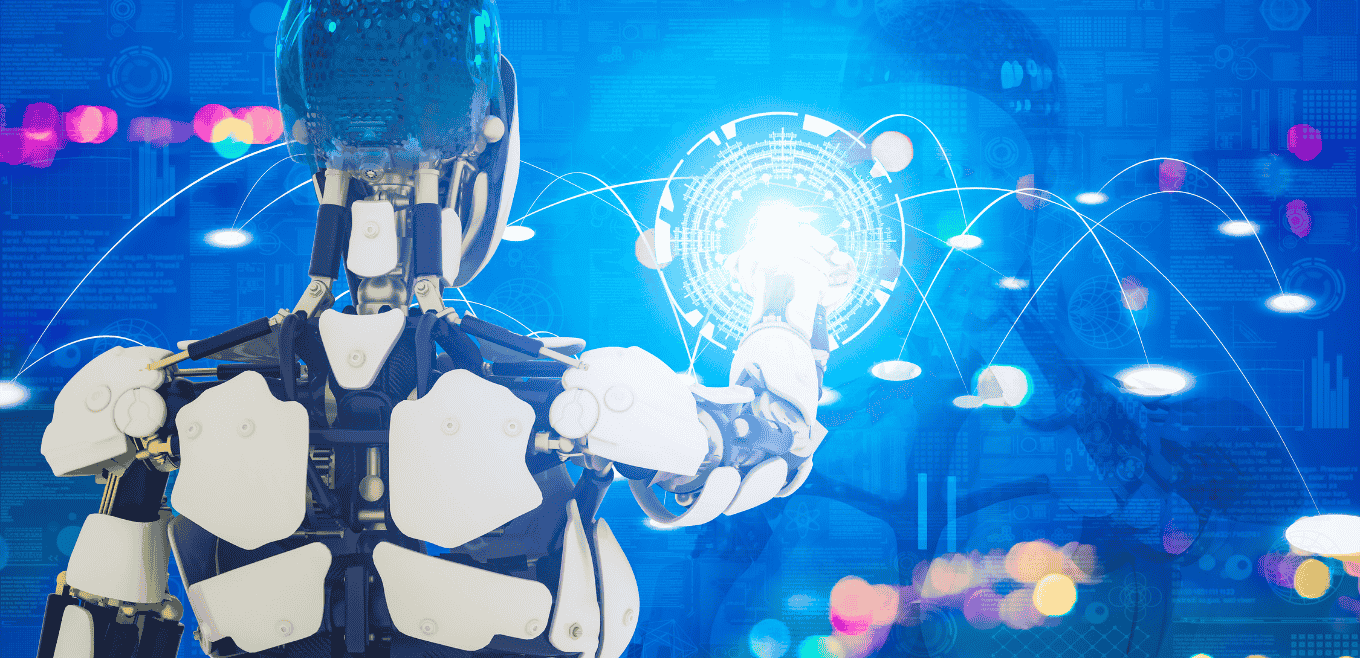Generative AI is a game-changing force driving innovation in today’s rapidly evolving global landscape. Gen AI is revolutionizing how manufacturers design, produce, and optimize their products by leveraging advanced machine learning models to create original content. This transformative technology paves the way for groundbreaking applications and impactful advancements across the manufacturing industry.
Far from being just a buzzword, Gen AI represents a paradigm shift that empowers manufacturers to harness automation and make smarter, data-driven decisions. As the industry continues its journey toward digital transformation, Gen AI plays a pivotal role in enhancing product quality, streamlining operations, and reimagining traditional processes. It is quickly becoming a cornerstone of innovation, setting the stage for a more efficient and agile manufacturing future.
Where does Gen AI make the impact?
Generative AI is transforming the manufacturing sector, creating a vision of AI-driven workplaces that deliver value across the plan-make-deliver continuum. With the global generative AI market projected to grow at an impressive rate of 24.40% and reach a market volume of $207 billion by 2030, its significance is undeniable.
Here are key areas where Gen AI is making a difference:
Enhanced Planning Processes
- Generative AI leverages cross-functional insights and qualitative data from customer experiences to improve demand forecasting.
- It recommends optimized production schedules to minimize supply chain disruptions and improve efficiency.
- Real-time inventory insights, such as condition tracking and reduction strategies, ensure effective stock management.
Improved Industrial Productivity
- Through root-cause analysis, generative AI reduces errors and identifies potential failures, driving higher productivity levels.
- AI-assisted systems enhance operator workflows by generating clear, dynamic job instructions and troubleshooting guides.
- Automated operational manuals further streamline processes, making workplaces more efficient and error-resistant.
Generative AI is reshaping manufacturing operations, offering innovative solutions to enhance planning, optimize productivity, and create a more agile, future-ready industry.
How can workflow be integrated with Gen AI?
Realizing the potential of Generative AI in business processes, which can result in significant increases in productivity, efficiency, and cost reduction, requires effective integration. Businesses must be more cautious and follow a methodical approach if they want to successfully incorporate Gen AI into manufacturing processes.
Assessing the current workflow and processes by closely observing the key areas with the aid of in-depth analysis to identify efficiencies, roadblocks, and general problems is crucial for the successful integration of Gen AI in production procedures. In order to predict specific use cases, give priority to manufacturing processes and tasks that stand to benefit the most from GenAI integration.
Constant observation and customer feedback combine to create a more dependable version of generative AI that assesses outcomes in addition to performance. Utilizing cross-functional programs has increased awareness and acceptance of GenAI technology worldwide, promoting collaboration among experts and domains.
10 Generative AI use cases in the manufacturing industry
The manufacturer is constantly under pressure to improve production procedures, streamline supply chains, provide customers with high-quality products, and promptly adjust to shifting market trends. In order to overcome these obstacles, generative AI adoption becomes very alluring and encourages highly intelligent, connected, and efficient manufacturing processes.

Understanding how generative AI is actually used in various operations is essential to shrewdly integrating its potential in manufacturing. We have described the applications of Gen AI in manufacturing in this section.
1. Product design and development
From designing to manufacturing to catering, the entire manufacturing process is centered around products. Because of its increased speed and agility, generative AI has a significant impact on product engineering in the core process of creating new products or continuously improving ones that already exist.
By establishing crucial metrics within the model, generative AI in the manufacturing sector enables product engineers to forego laborious research and concentrate entirely on design. GenAI uses sophisticated algorithms to offer a variety of conceptual design options, automate design optimization, facilitate accurate testing, and assist in producing optimal product solutions that are ready for the future.
It enables engineers to closely monitor, assess, and refine designs before manufacturing by creating lifelike 3D models and digital twins of products and simulating product performance in design or virtual format. Consequently, GenAI is a comprehensive solution for designing and building robust and custom products to accelerate time to market.
2. Supply chain management
Supply chain management is being revolutionized by GenAI’s capacity to analyze data and produce content in a variety of formats, such as text, images, and videos. Disruptions to the supply chain include major manufacturing challenges.
Manufacturers have extensive visibility across interconnected parts thanks to GenAI. By analyzing several variables, such as raw material availability, cost, possible hazards, etc., it also adds value by suggesting and choosing suppliers. Furthermore, knowledge gained from past dealings with suppliers helps to improve the partnership. To guarantee seamless transactions and enhance the decision-making process, it provides real-time insights into ongoing supply chain performance.
3. Customer service support
It will soon be commonplace to redefine customer services by combining generative AI, large language models, and manufacturing. Chatbots and virtual assistants driven by GenAI facilitate faster interactions with customers according to their individual needs, guaranteeing prompt issue resolution, evaluating customer inquiries, and offering precise, detailed troubleshooting instructions.
GenAI can now converse with customers in a more natural and human-like manner thanks to the development of LLM. Responding to reviews and answering frequently asked customer questions about orders, exchanges, returns, billing, and other matters, the solution can work around the clock. Furthermore, this revolutionary technology can act as the manufacturer’s agent to improve customer satisfaction and effectively handle field questions.
4. Performance optimization
A crucial component of manufacturing is performance optimization, and artificial intelligence is revolutionizing this field as well. By examining historical data, real-time sensor data, and other pertinent variables, AI algorithms are able to spot trends, spot abnormalities, and generate data-driven predictions. As a result, manufacturers can increase overall equipment effectiveness, reduce downtime, and optimize operations.
One real-world example of how artificial intelligence alters factory performance optimization is General Electric (GE). In order to analyze vast amounts of data from sensors and historical records, GE has incorporated AI algorithms into its manufacturing processes. With AI, GE can identify patterns, anticipate likely equipment problems, and optimize procedures. GE can increase overall equipment effectiveness, decrease equipment downtime, and increase manufacturing operations efficiency by adopting this proactive strategy.
Optimize the performance and efficiency of your manufacturing business with an innovative custom AI-based solution.
5. Predictive maintenance scheduling
When even extremely sophisticated machinery and equipment are integrated, the intricate structure of the manufacturing workflow increases. Machine malfunctions and failures are a frequent occurrence in this fast-paced business environment, impeding all related operations and resulting in disgruntled customers. Predictive maintenance is turning out to be the best strategy for addressing this inefficient distribution that isolates other area operations.
Predictive maintenance that incorporates generative AI and IoT could completely change how manufacturing companies handle equipment maintenance. A lack of data science talent and the volume of data can make it difficult to strategically implement predictive maintenance. However, by automating data analysis and creating synthetic datasets, generative AI in manufacturing enables the resolution of all these issues.
Generative AI-powered predictive maintenance reduces downtime, optimizes maintenance procedures through carefully thought-out scheduling, and enables the manufacturing sector to achieve significant cost savings. Gen AI is an effective tool for predictive maintenance because it can learn from preexisting datasets and produce new insights.
6. Quality control
In the manufacturing sector, generative AI is essential for managing production and preserving product quality. Given the difficulty of diagnosing problems based only on functional observation, traditional methods of identifying internal equipment malfunctions frequently prove difficult, even for experts. However, combining AI and machine learning technologies offers a revolutionary way forward.
Even the smallest equipment flaws can be quickly identified by generative AI systems. Leveraging these systems reduces downtime and expenses associated with unexpected equipment failure by making the detection of possible problems proactive rather than reactive.
Sensors mounted on essential equipment collect data throughout the manufacturing process. Then, sophisticated algorithms examine the data to find anomalies or trends that might point to future problems.
By doing this, generative AI enables real-time intervention, proactively preventing issues and guaranteeing a seamless and effective production flow, providing the manufacturing sector with substantial operational advantages.
To prevent major production problems from getting worse, generative AI systems identify possible mistakes and notify stakeholders instantly. These AI-driven systems report production flaws immediately and actively monitor themselves.
Revolutionize Your Workflow with Generative AI
Discover how our GenAI-based code review platform helped a leading logistics client reduce unit test generation time by 50% and boost code quality by 30%.
7. Enterprise knowledge management
Mergers and acquisitions frequently lead to the growth of the manufacturing sector, creating a fragmented infrastructure of systems and procedures. Because of this, many workers may find it difficult to find the right information, which can result in significant time waste and decreased productivity. To solve this problem, putting in place an enterprise knowledge bot driven by a complex language model, such as ChatGPT, can be revolutionary.
A bot like this can significantly cut down on the amount of time workers spend looking for information, which will increase productivity. ChatGPT and other generative AI apps are excellent at comprehending and producing text that is human-like, which allows them to sort through enormous volumes of data and extract accurate and pertinent information in response to user inquiries. They are an all-in-one resource for enterprise-wide information since they can be trained on a variety of data, including internal process guidelines and product manuals.
These AI models can also adjust and learn from new data, which guarantees that the information they offer is current and applicable and supports an ongoing learning process inside the company. Even in situations where documentation may be lacking, the capabilities of such an AI bot can be expanded to identify business rules from legacy applications. Organizations can better manage and utilize their accumulated knowledge by using this ability to extract and interpret information from a variety of sources. This can improve decision-making, streamline operations, and boost productivity while promoting an environment of ongoing learning and development.
8. Machine automation and optimization
In the manufacturing industry, generative AI plays a revolutionary role in process automation and optimization. These tools collect a vast array of operational and performance data, offering vital information about several manufacturing process elements, from supply chain effectiveness to equipment health. Training generative AI models is based on the collected data.
Calculating Overall Equipment Effectiveness (OEE), a critical indicator of manufacturing operation utilization is a noteworthy use of these models. It results from the interaction of three different factors: quality, performance, and availability. Several fundamental metrics, such as run times, downtime, speed, output, and quality, are the source of these factors.
The computation of these metrics is greatly improved by generative AI models, which use real-time data gathered from multiple sensors mounted on the equipment. To identify anomalies that could impact the OEE, like unplanned outages or quality problems, these models are trained to evaluate operational data, compute OEE metrics, and identify typical patterns in the data.
9. Research & development
With the help of data-driven R&D in manufacturing, generative AI functions as a powerful tool that provides cutting-edge methods for identifying emerging market trends, evaluating product utilization, and better understanding what the customer wants. By presenting a concise overview of the datasheet’s salient features, this descriptive analysis sheds light on the historical data as well as potential future trends.
10. Management of production and inventory
The main causes of cost overruns in the manufacturing sector are inaccurate inventory management and inefficient resource allocation. The main issues that render the entire process ineffective are inadequate demand forecasting, a lack of inventory visibility, and overstocking and out-of-stock scenarios. For the manufacturing sector, generative AI may pave the way for efficient inventory and production control.
The GenAI model can examine market trends, previous sales data, and other important variables. By adjusting their production processes to meet the changing needs of inventory, manufacturers can gain confidence based on these insights. The use of GenAI in production planning aids in the achievement of ideal workflow, resource allocation, and production schedules.
How People10’s custom AI solutions drive manufacturing excellence
The transformative impact of artificial intelligence in manufacturing is undeniable. From optimizing supply chain management to enabling predictive maintenance, AI has significantly enhanced productivity, accuracy, and cost-effectiveness across various manufacturing processes. To unlock the full potential of AI in your operations, partnering with experienced artificial intelligence development services is essential.
At, People10, we specialize in delivering tailored AI and ML development services designed specifically for manufacturing companies. With a deep understanding of the industry’s challenges and opportunities, we provide innovative services that drive operational efficiency and accelerate growth.
As the manufacturing sector continues to evolve, our expert teams lead the way in developing cutting-edge AI solutions. By leveraging our expertise, manufacturing businesses can harness the power of AI and ML to revolutionize their operations, achieve higher levels of excellence, and thrive in today’s competitive market.
Partner with People10 to stay ahead of the curve and take your manufacturing capabilities to the next level.
Over 50% of Manufacturers are Now Relying on AI for Their Day-to-day Operations
Still lagging in reaping its benefits?
Author
Shrutha Sekharaiah brings over 13 years of experience in delivering innovative, scalable solutions. His broad expertise in technology and focus on collaboration and mentorship drive the creation of robust systems enhancing efficiency and performance.



